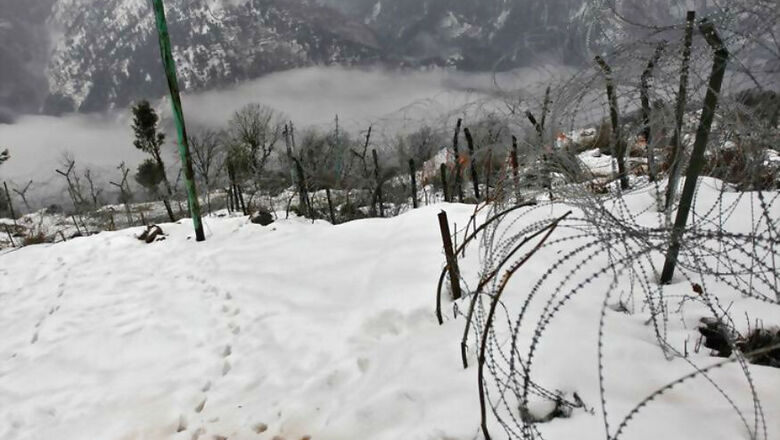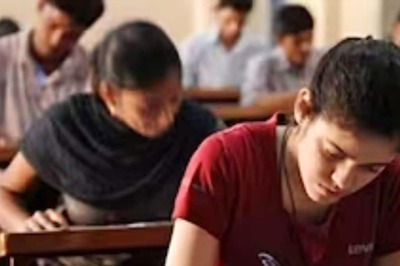
views
Srinagar: Mohammad Maqbool (18) relentlessly made calls to his parents. He and his four siblings had been living in a temporary camp for the people affected by cross-LoC shelling in Uri. His parents were in Silikote village situated on the ‘zero-line’ 10 km away.
On February 22, as the shelling started, Maqbool’s father Abdul Qayoom, and mother Akhter Begum asked their children to leave, but stayed put themselves. “We have cattle and we survive on them. They didn’t want to abandon the cattle, that’s why my parents did not leave home," said Maqbool.
On the third day, Maqbool called his mother Akhter Begum over phone, pleading her to leave home. “We can’t leave. There is respite in the exchange of fire," Begum answered, adding that a nearby house had been hit by a mortar shell.
Relentless and angry, Maqbool sat down on the porch of a school building doubling up as a relief camp. The temperature plummetted further due to the odd spell of showers. But Maqbool was sweating.
“I told them to leave with us. A bullet has no sight and these old people have no mind," said Maqbool in utter frustration.
Most of the families from Maqbool’s village left their houses and were living in the camp, erected in a school building. But many were stuck in the village as the shelling intensified. “I have never seen such a situation in my life," he said. “My Class 12 examinations are three days away, but I don’t care about it now. I want my parents to be safe."
Around half-past 11, Maqbool’s phone rang. It was his mother on the other side. “There are announcements from Pakistani side that they are going in for heavy shelling. Evacuate us!"
Now clearly panicking, Maqbool rushed towards an officer. He requested for an ambulance to evacuate his parents. “Don’t worry sir, I will accompany the driver. If he is not willing to go, I will drive," he said, making frantic appeals to the government medical official.
He ran, with his cousins Shabir and Tariq in tow, in rain to a nearby hospital. The medical officer at the hospital gave him the contact number of the ambulance driver, who was on his way from a nearby health centre.
Maqbool agreed to take this reporter along. We ran towards the main road and in the next five minutes, got in the ambulance, which was basically a shabby mini-bus with a siren and a beacon.
The ambulance driver was a 40-year-old man called Mohammad Ashraf Ganie from nearby hamlet of Garkote. As we reached the muddy road, crisscrossing the mountainous terrain, we actually began to spot shells flying all over. Every bang of mortar and artillery shelling shook the ambulance’s window panes.
As we turned past another curve promptly, the deep gorge on our right side was terrifying. But more horrific was the road ahead. It had just started to pour heavily when Ashraf hit the brakes. Suddenly, we could see bullets piercing the road ahead.
Maqbool and his friends shouted in unison, directing Ashraf not to stop: “We are in open zone, move."
As we drove, the bangs intensified and the targets were evident now. Everyone was scared, but there was no going back.
After half-an-hour, we halted near Balkote, when a bearded man in his 50s came out of his house and stopped the ambulance. He was Farooq Ahmad, a retired soldier who took us into his home, advising us not to move ahead.
He was staying put with his mother, wife and brother. “I will not leave. Somebody has to be here," he said, maintaining his composure while bullets and mortar shells could be heard going off in the background.
It seemed as though the shells were landing just a few meters away. He took us into his private bunker, a concrete room built in his house on a hilly slope.
By now, Maqbool jumped out and directed Ashraf to take the ambulance back by at least half a km towards safety. But Maqbool started in the opposite direction, towards his village which was now just a kilometre away.
Meanwhile, in the bunker, Basheer showed us holes made by high-caliber bullets, which pierced even through the concrete of his bunker. There was no respite from the rains either. Everyone in the house began praying fervently.
After a couple of minutes, an elderly man came running towards Bashir’s house, weeping inconsolably. “My house has been struck by a shell. Khudaya, main kaha javo. Sab barbad ho gaya (God where will I go, everything is ruined)."
Farooq and his brother showed us photographs on their mobile phones. The bullets had pierced walls. Some bullets had landed in their kitchen. He said we were not safe even in the bunker. “It can get destroyed if a mortar shell lands on it."
Despite repeated requests, neither Farooq nor family agreed to come with us.
Meanwhile, Maqbool called us with the good news that he had found his parents. Farooq bid us farewell with an advice — run up to the ambulance. “Whatever happens, don’t stop. You can become targets of a sniper," he said.
It was still raining heavily as we ran for our lives. The run to the ambulance appeared to be the longest ever. But we made it. As we stepped in, we found everyone in the ambulance crying. Maqbool’s mother Akhter Begum was sitting right in front.
“She was lying unconscious when I entered the house," said Maqbool, who had met his father on the way.
Maqbool also managed to rescue two more families in the neighbourhood. We drove past, but Akhter Begum was crying. Her mother and brother were still stuck in another house which couldn’t be reached.
Ashraf drove the jam-packed ambulance through the same treacherous road. A father of four children, Ashraf said he had never been on such a daredevil mission in his seven years as an ambulance driver.
Maqbool’s father raised his hands in the air and said prayers: “Thank God, we are alive!"
As we reached the relief camp, everyone broke down and the people who had assembled there started hugging us. It was a rescue from death.



















Comments
0 comment